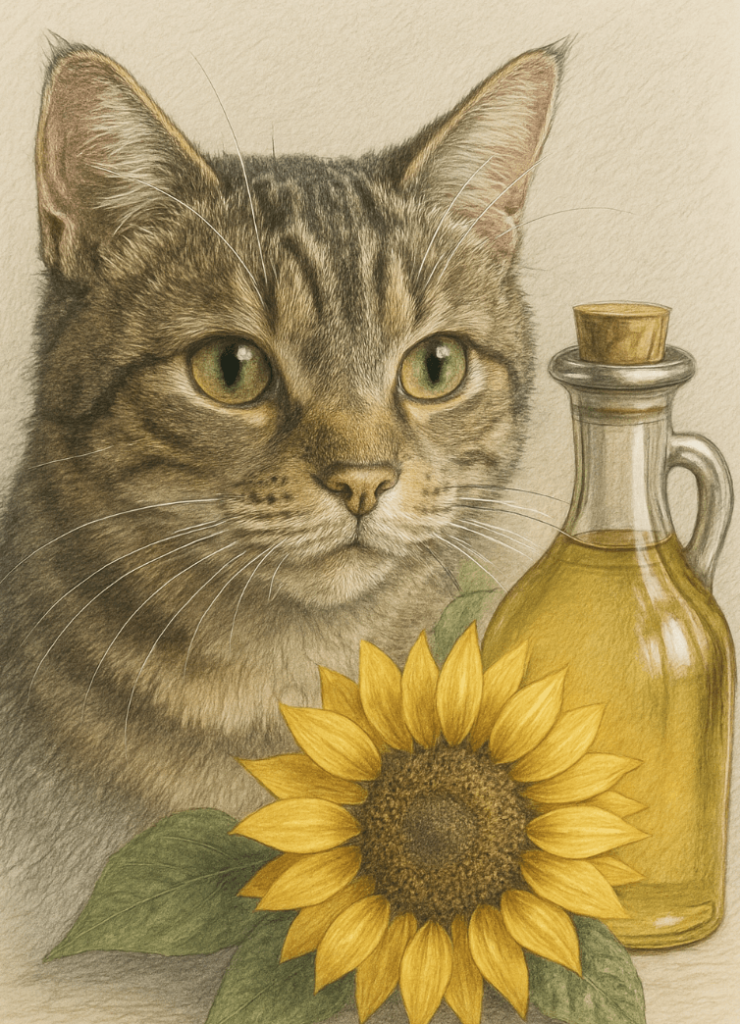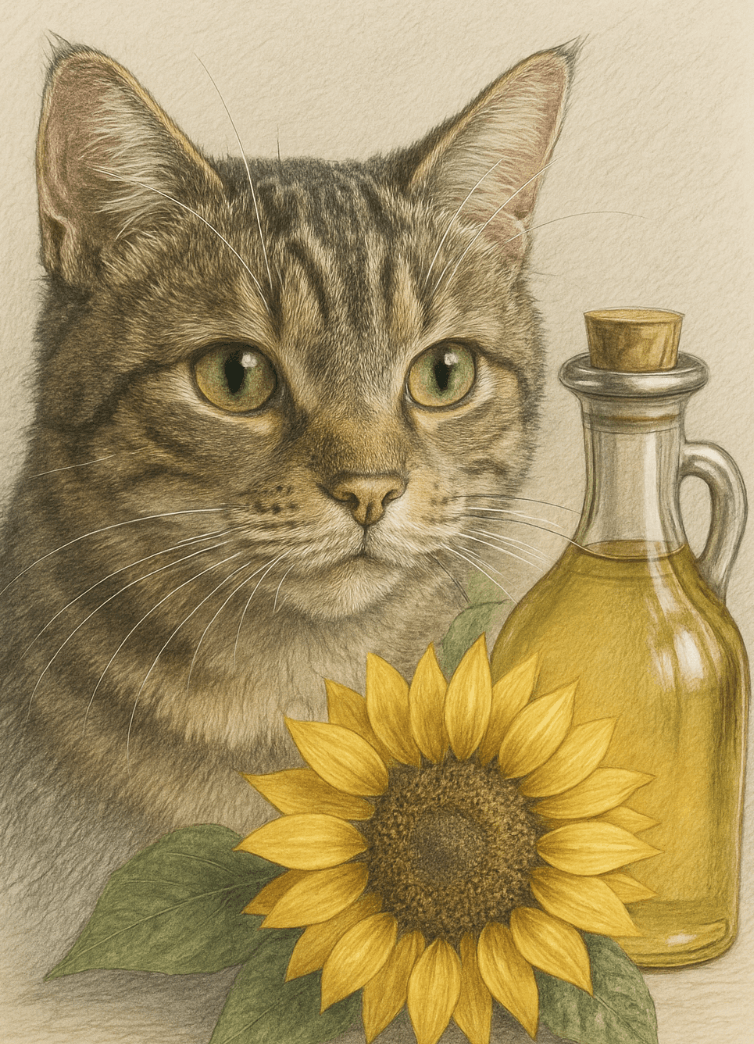Can Cats Eat Sunflower Oil?
When it comes to our feline friends, we’re often curious about what human foods or ingredients are safe for them. One such question that arises is whether cats can eat sunflower oil. While sunflower oil is a common household ingredient used in cooking and skincare, its suitability for cats isn’t immediately obvious. Cats have unique dietary needs as obligate carnivores, meaning their bodies are designed to thrive on animal-based proteins. However, some plant-based oils, like sunflower oil, may offer certain benefits when used sparingly. In this blog post, we’ll explore the safety, potential benefits, and risks of feeding sunflower oil to cats, along with expert advice to ensure your pet’s health and happiness.
Potential Benefits of Sunflower Oil for Cats
In moderation, sunflower oil can provide some health benefits for cats. Here’s how this oil might positively impact your furry friend.
Supports Skin and Coat Health:
The omega-6 fatty acids in sunflower oil can promote a shiny coat and reduce dryness or flakiness in your cat’s skin.Improves Digestive Function:
A small amount of sunflower oil may help lubricate the digestive tract, easing constipation or hairball issues.Boosts Immune System:
The antioxidants in sunflower oil can support your cat’s immune system, helping them fight off infections.Adds Flavor to Food:
For picky eaters, a drop of sunflower oil can enhance the taste and aroma of their meals, encouraging them to eat.Anti-Inflammatory Properties:
Omega-6 fatty acids also have mild anti-inflammatory effects, which may benefit cats with joint discomfort or allergies.
While these benefits exist, it’s important to use sunflower oil sparingly to avoid unintended side effects.
Risks and Concerns of Feeding Sunflower Oil to Cats
Despite its potential benefits, sunflower oil isn’t without risks. Overuse or improper application can lead to health issues for your cat.
Weight Gain and Obesity:
Sunflower oil is calorie-dense, and excessive consumption can contribute to unhealthy weight gain in cats.Digestive Upset:
Too much oil can upset your cat’s stomach, leading to diarrhea, vomiting, or nausea.Imbalance of Fatty Acids:
Excessive omega-6 fatty acids without sufficient omega-3s can create an imbalance, potentially causing inflammation.Not a Substitute for Proper Nutrition:
Sunflower oil should never replace a balanced diet rich in animal proteins and essential nutrients.Allergic Reactions:
Though rare, some cats may have sensitivities or allergic reactions to plant-based oils like sunflower oil.
Understanding these risks ensures you use sunflower oil responsibly and prioritize your cat’s overall health.
Check this guide 👉Can Cats Eat Scorpions? Best 7 Expert Tips!
Check this guide 👉Can Cats Eat Liverwurst? Best 7 Expert Tips!
Check this guide 👉Can Cats Eat Rabbits? Best 7 Expert Tips!

Benefits of Sunflower Oil for Cats | Risks of Using Sunflower Oil for Cats |
|---|---|
Promotes healthy skin and coat | Can lead to weight gain if overused |
Aids digestion and reduces hairballs | May cause digestive upset in large doses |
Supports immune system function | Creates fatty acid imbalances |
Enhances food flavor for picky eaters | Shouldn’t replace proper nutrition |
Contains mild anti-inflammatory properties | Rare risk of allergic reactions |
How to Safely Introduce Sunflower Oil to Your Cat
If you decide to incorporate sunflower oil into your cat’s diet, it’s crucial to do so carefully and in moderation. Follow these guidelines to ensure safety.
Start with Small Amounts:
Begin with just a few drops (about ¼ teaspoon) mixed into their food to see how they react.Choose High-Quality Oil:
Opt for cold-pressed, unrefined sunflower oil to ensure it’s free from harmful additives or chemicals.Monitor for Side Effects:
Watch for signs of digestive upset or allergic reactions after introducing the oil. Discontinue use if issues arise.Limit Frequency:
Use sunflower oil no more than once or twice a week to prevent overconsumption and maintain balance.Consult Your Veterinarian:
Always seek professional advice before adding any new ingredient to your cat’s diet, especially if they have pre-existing health conditions.
By following these steps, you can safely explore the benefits of sunflower oil while minimizing risks.
Signs Your Cat May Be Sensitive to Sunflower Oil
Even with careful introduction, some cats may show sensitivity or adverse reactions to sunflower oil. Recognizing these signs allows you to act quickly.
Diarrhea or Vomiting:
These are common symptoms of digestive upset caused by excessive or inappropriate use of oil.Excessive Licking or Scratching:
Increased grooming or scratching may indicate skin irritation or an allergic reaction.Loss of Appetite:
If your cat refuses to eat after consuming sunflower oil, it could signal discomfort or dislike.Lethargy or Weakness:
Unusual tiredness might suggest that the oil is affecting their energy levels or overall health.Swelling or Redness:
Visible swelling around the face or redness on the skin points to a possible allergic response.
If you notice any of these signs, stop using sunflower oil and consult your veterinarian immediately.
Common Misconceptions About Sunflower Oil for Cats
There are several misconceptions about using sunflower oil in a cat’s diet. Clearing up these myths helps ensure responsible use.
Myth: Sunflower Oil Is Essential for Cats:
Cats don’t require sunflower oil; their primary nutritional needs come from animal-based proteins and fats.Myth: More Oil Equals Better Results:
Overusing sunflower oil can harm your cat’s health rather than improve it.Myth: All Oils Are Safe for Cats:
Not all oils are suitable—some, like essential oils, can be toxic to cats.Myth: Sunflower Oil Prevents Hairballs Completely:
While it may help, it’s not a guaranteed solution for hairball issues.Myth: Cats Love the Taste of Sunflower Oil:
Some cats may enjoy it, but others might find it unappealing or refuse to eat it.
Dispelling these myths ensures a better understanding of how to use sunflower oil safely.
Healthier Alternatives to Sunflower Oil for Cats
If you’re looking for alternatives to sunflower oil, there are healthier options that may better suit your cat’s needs.
Fish Oil:
Rich in omega-3 fatty acids, fish oil supports skin, coat, and joint health without the risks of omega-6 imbalance.Coconut Oil (in Moderation):
Coconut oil has antimicrobial properties and may aid digestion, though it should be used sparingly due to its fat content.Pumpkin Puree:
An excellent natural remedy for digestive issues like constipation or hairballs, without the need for added oils.Veterinary Supplements:
Specialized supplements formulated for cats provide targeted nutrition without guesswork.Hydration Through Wet Food:
Increasing moisture intake via wet food can support skin and digestive health naturally.
These alternatives offer safer and more effective ways to address specific health concerns in cats.
Fun Facts About Cats and Their Diet Preferences
Cats are fascinating creatures with unique dietary habits and preferences. Here are some interesting insights related to their eating behaviors.
Cats Lack a Sweet Tooth:
Unlike humans and dogs, cats cannot taste sweetness due to a missing gene in their DNA.Obligate Carnivores by Nature:
Cats require taurine, an amino acid found primarily in animal tissue, making plant-based diets unsuitable for them.Sensitive to Strong Smells:
Cats rely heavily on scent to determine whether they’ll eat something, so strong-smelling oils might deter them.Small Portions, Frequent Meals:
Cats prefer eating small amounts throughout the day, mimicking their natural hunting behavior.Curiosity Drives Food Choices:
Many cats are drawn to novel flavors or textures, which explains why they might occasionally try unusual foods.
Understanding these quirks deepens your appreciation for your cat’s unique relationship with food.
Frequently Asked Questions About Cats and Sunflower Oil
Is sunflower oil toxic to cats?
No, sunflower oil is not inherently toxic, but it should be used sparingly to avoid health issues.
How much sunflower oil can I give my cat?
Limit intake to a few drops (about ¼ teaspoon) per serving, no more than once or twice a week.
Can kittens eat sunflower oil?
It’s best to avoid giving sunflower oil to kittens, as their digestive systems are still developing.
What’s the best alternative to sunflower oil for cats?
Fish oil or other omega-3-rich supplements are safer options for supporting skin and coat health.
What should I do if my cat accidentally consumes too much sunflower oil?
Monitor for symptoms like diarrhea or vomiting, and contact your vet if problems persist.
Prioritizing Your Cat’s Health When Using Sunflower Oil
While sunflower oil can offer certain benefits for cats, it’s not a necessity and should always be used with caution. Understanding its potential advantages and risks ensures you make informed choices that align with your cat’s dietary needs. Always prioritize high-quality nutrition and consult your veterinarian before introducing any new ingredient. By doing so, you can keep your feline companion healthy, happy, and thriving. Remember, moderation and mindfulness are key when it comes to enhancing your cat’s diet with unconventional additions like sunflower oil.
Can a Cat Be Tested for Rabies? Best 7 Expert Tips! – Learn if testing is possible, understand the process, and discover prevention tips to keep your cat safe from rabies.
Can a Dog Be Tested for Rabies? Best 7 Expert Tips! – Learn how rabies testing works, why it’s critical, and what every dog owner needs to know.
Best Vegetables for Cat Food: Best 7 Expert Tips! – Discover safe, nutritious veggies to boost your cat’s diet, support digestion, and enhance overall health naturally.
Best Vegetables for Dog Food: Best 7 Expert Tips! – Discover safe, nutritious veggies to boost your dog’s diet, support digestion, and enhance overall health naturally.





